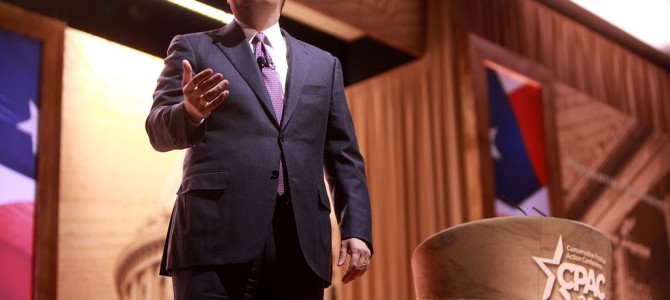
How would the election of such as Sen. Ted Cruz, Dr. Ben Carson, or Gov. Mike Pence in 2016 affect U.S. foreign policy? In previous columns, I have outlined what might be the foreign policy proclivities of candidates who represent the Republican Party establishment (e.g., Jeb Bush), the Democratic establishment (Hillary Clinton), of libertarians (Sen. Rand Paul), and of progressives (Sen. Elizabeth Warren) without speculating on the chances any might have of being elected.
Were anyone to argue that the foreign policy consequences of a Tea Party president are irrelevant because none is likely to be elected, I would suggest first, that the several conservative constituencies—who support the Club For Growth, are pro-family, pro-life, pro-gun rights, etc.—often jointly referred to as “Tea Party,” are at least as numerous as any other element of America’s body politic. Second, if anything is clear about our body politic today, it is its massive dissatisfaction with Democrats and disillusionment with Republicans. More than ever, Americans vote less according to party than for or against identities and issues. Hence, in the fluid politics of 2016, another Bush or another Clinton will struggle against whoever offers a populist alternative to the establishment, whether a Progressive Warren, conservative Cruz, or libertarian Paul.
Herewith, then, some insight into how the heart and mind of the Tea Party might incline a president of its own with regard to foreign policy.
Distinct from the Establishment, Libertarians, and Progressives
Having practiced law at the highest levels, Cruz has had little time to think deeply about foreign affairs. Carson, busy advancing the theory and practice of brain surgery, has had even less. Indiana has occupied Pence’s heart and mind. These and similar persons, however, would bring to the presidency a set of attitudes that is second nature in American society’s Tea Party contingent—attitudes that make for a foreign policy very different from that of progressives or Libertarians, as well as from of our bipartisan establishment’s neoconservative consensus.
Tea Party patriotism, for example, differs substantially from the neoconservative kind now standard in the Republican establishment, the Wall Street Journal, or Fox News. The difference lies in contrasting visions of America’s greatness, which have divided America’s rank-and-file from the people who have run U.S. foreign policy since Woodrow Wilson. For these, America’s greatness, our value, is our capacity to lead and improve mankind by settling its quarrels.
By contrast, Tea Party Americans, hearkening as they do to statesmen from George Washington to Theodore Roosevelt, the men on Mount Rushmore, as well as to Ronald Reagan see America’s greatness as that of the “city on a hill,” which keeps itself exceptional to mankind’s corruption, whose example may or may not inspire others to follow. Hence a Tea Party president would be more reluctant than a Republican to make foreign commitments.
Neither a Pacifist Nor a War-Monger
But, following America’s pre-Progressive tradition and popular sentiment, a Tea Party president would use all of America’s power to defend America’s interests and to keep its commitments. That includes waging war in the dictionary meaning of the term—killing and destroying massively and quickly until the enemy ceases to resist, or to exist—unto victory and peace. For example, if a Tea Party president had committed America to destroying the Islamic State that beheads Americans, persons from Minneapolis, Melbourne, or Manchester who now yearn to imitate or to join the Islamic State would instead be aghast at its gruesome end and discredit.
Reverence for the Constitution being perhaps Tea Party America’s most distinctive feature, and opposition to rule by executive order at home being one of its principal objectives, a Tea Party president’s foreign policy may be expected to reduce the number of executive agreements and to submit more and more of U.S. commitments to the Senate’s “Advice and Consent.” Instead of using agreements with foreign governments as a means of advancing policies against the wishes of the people’s elected representatives, a Tea Party president’s foreign-policy-by-treaty would try to make foreign relations into one more set of circumstances in which the Congress would, as James Madison wrote, “refine an enlarge the public view.”
Peace is Tea Party America’s primary objective with regard to foreign nations. But, since it distrusts all of them, its consensus—unspoken and overwhelming—is that U.S. military power, rather than any alliance or arrangement, is the key to our peace. Hence a Tea Party president, unlike a Progressive, would not expect the “third world” in general to become friendlier to us—never mind traditional enemies. For example, as our time’s struggle within the Muslim world rages, he would impress on its contenders the deadly consequences of harming Americans. Unlike a Libertarian, he would not trust in economic interest to secure America’s access to the Western Pacific, but would react to China’s military preparations to exclude us from the region by building and basing a military force to secure that access no matter what China might do.
The majority of Americans tell pollsters they believe our country already possesses a sound defense against ballistic missiles. In fact, different rhetorical emphases notwithstanding, the Democratic and Republican establishments have colluded to leave America defenseless against any serious missile attack from anywhere. For a Tea Party president, building a missile defense would be a top priority.
In sum, the first Tea Party president, transcending today’s sterile confrontations between “interventionism” and “isolationism,” between “moralism” and “realism,” would practice a foreign policy as defined by George Washington: to “choose peace or war, as our interest, guided by justice, shall counsel.”









